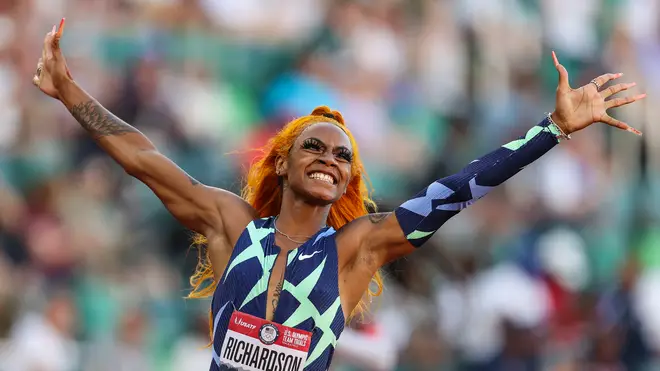
Nick Abbot 10pm - 1am
2 July 2021, 15:30

American sprinter Sha'Carri Richardson has been suspended for one month after testing positive for a substance of abuse, the United States Anti-Doping Agency (USADA) has announced.
The 21-year-old 100 metres star tested positive for THC, the main psychoactive ingredient in marijuana, during in-competition testing at the US Olympic Trials on June 19, and her Olympic qualifying results have been disqualified.
It means she will be unable to participate in the 100m sprint, although she may still be able to take part in the 100m relay.
"The rules are clear, but this is heart-breaking on many levels," said USADA chief executive Travis Tygart.
"Hopefully, her acceptance of responsibility and apology will be an important example to us all that we can successfully overcome our regrettable decisions, despite the costly consequences of this one to her."
Read more: Statue of the Queen toppled in Canada during protest over indigenous children deaths
Read more: Brits who received Indian-made AstraZeneca jabs ‘could be barred from visiting Europe’
Richardson has posted the second-fastest 100m time in the world this year, at 10.72 seconds.
USADA said the period of ineligibility had been reduced to one month, starting from June 28, instead of the usual three-month period because her use of cannabis occurred out of competition, was unrelated to her sport performance and because she completed a counselling programme in relation to the drug use.
Her ban will be up by the time the relay takes place, but it is unclear whether or not she will participate.
USADA said it was up to the United States Olympic and Paralympic Committee (USOPC) and USA Track and Field (USATF) to determine her eligibility for the Games.
The USOPC said: "While we are heartbroken, the USOPC is steadfast in its commitment to clean competition and it supports the anti-doping code.
"A positive test for any banned substance comes with consequences and we are working with USATF to determine the appropriate next steps.
"We are dedicated to providing Sha'Carri the support services she needs during this difficult time."

Tom Swarbrick's exchange with reporter on rules for Tokyo Olympics
USATF posted a statement on its website which read: "Sha'Carri Richardson's situation is incredibly unfortunate and devastating for everyone involved.
"Athlete health and well-being continue to be one of USATF's most critical priorities and we will work with Sha'Carri to ensure she has ample resources to overcome any mental health challenges now and in the future."
Richardson's positive test came a week after the death of her biological mother.
"I apologise for the fact that I didn't even know how to control my emotions or deal with that during that time," she told NBC on Friday.
Read more: What is the EU Digital Covid Certificate and can I get one?
Read more: 'She's an absolute legend': James O'Brien praises Kim Leadbeater after her by-election win
She also said: "I greatly apologise if I let you guys down - and I did.
"This will be the last time the US comes home without a gold in the 100m.
"I'm 21, I'm very young, I have plenty of Games left in me to compete in and plenty of talent that backs me up because everything I do comes naturally to me, no steroids or anything.
"This incident was about marijuana so after my sanction is up I'll be back.
"Next time I step on the track I'll be ready for whatever anti-doping agencies come and [they will] get whatever they need because this will never happen again."
Read more: Boris Johnson to meet Angela Merkel for talks on Covid travel rules
Read more: NI prosecutors drop case against ex-soldier accused of killing boy, 15, in 1972
All natural and synthetic cannabinoids are prohibited in-competition by the World Anti-Doping Agency, and can come with a ban of up to four years.
However this can be reduced if the individual can show it was not related to sports performance and if they agree to a treatment programme, both of which apply in Richardson's case.